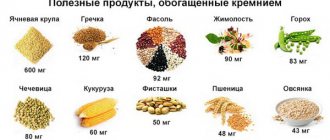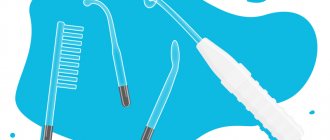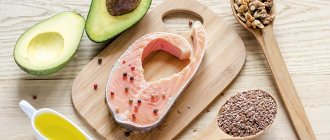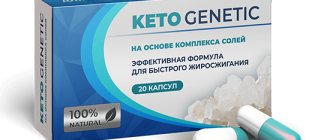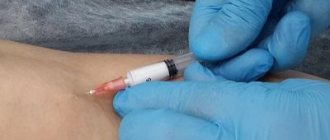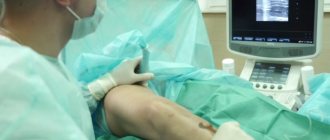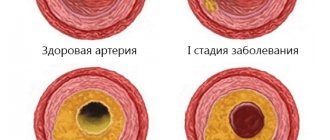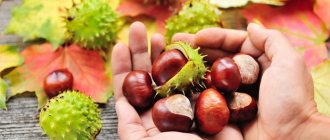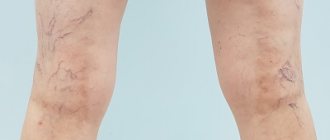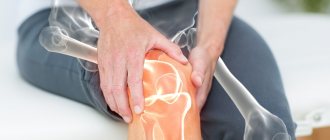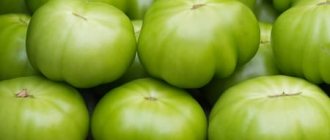In order for blood circulation in our body to function normally, it is necessary to constantly monitor the condition of the walls of blood vessels. And carry out systematic measures to strengthen them. If you provide assistance to your blood vessels in a timely manner, you can avoid serious diseases such as varicose veins, thrombosis, thrombophlebitis, and others.
One of the frequent questions from patients at our vascular center in Moscow is: “When should you pay attention to your blood vessels and prevent varicose veins on your legs?”
We have already talked about the causes of varicose veins on the legs in the article “I say NO to varicose veins.” Let's take a closer look at what symptoms may arise at the initial stage during weakening of the vascular wall.
The first 7 symptoms of varicose veins on the legs that are not taken seriously
When mentioning varicose veins, many patients imagine the disease like this: bulging veins, dark spots on the legs and a feeling of pain. However, these are symptoms of advanced development of the disease, and the patient ignores the first signs of varicose veins.
The first symptoms of varicose veins:
- Short-term dizziness;
- Cooling of extremities;
- Numbness of the legs;
- Mild pain;
- Distracted attention;
- Difficulty in the functioning of the speech apparatus;
- Change in skin color on the legs.
The appearance of at least one of these symptoms indicates that the vessels need support. To prevent the progression of varicose veins on the legs, you should reconsider your diet and lifestyle. Any favorable changes can significantly reduce the risk of developing the disease.
The main principles of healthy eating
- Limit consumption of animal fats. Include only lean meat (beef, veal, white poultry) in moderation in your diet.
- Reduce the amount of dairy products.
- Vegetable side dishes should be prepared for breakfast, lunch and dinner. They should make up half the serving. To prepare, use several types of vegetables that can be baked, stewed or boiled.
- Your diet must include foods containing omega-3 fatty acids. They are found in fish, seeds, nuts, and vegetable oil.
- Limit salt so that fluid does not retain in the body and there is no unnecessary stress on the heart.
- Avoid fried, smoked and spicy foods.
- Avoid alcohol, caffeine, canned and refined foods.
Habits that damage blood vessels in your legs every day
Some habits have a detrimental effect on health and, first of all, this concerns blood vessels. The structure of blood vessels can be disrupted by:
- Insufficient physical activity. As you know, life is movement. A person needs to constantly move to keep the blood vessels in good shape. You should not stay in one position for a long time; change the position of your legs every 20 minutes. And don’t forget to do simple exercises in the morning and evening; it won’t take much time, but it will be a good prevention of varicose veins on the legs.
- Excessive loads. A person needs to move, but you shouldn’t overexert your body. Due to intense training and exercise in the gym, work in the country, heavy lifting and other loads, pressure in the vessels of the lower extremities increases significantly, which leads to stretching of the muscle fiber and the development of valvular insufficiency.
- Smoking has a negative effect not only on the respiratory system, but also on the blood vessels of the entire body. Toxic tobacco tars, entering the blood, destroy the walls of blood vessels and reduce their elasticity.
- Wrong wardrobe. Fashionable jeans that are tight around the legs and pelvis, socks with a tight elastic band, and tight, tight shoes disrupt the normal blood flow in the lower extremities, thereby causing swelling and blood stagnation.
- Overheating of the body. High temperatures cause the vessels to expand to their limits. Frequent and/or long periods of time in a bathhouse, under the scorching sun or on the beach also contribute to the dilation of blood vessels, which reduces their elasticity. And these are the first prerequisites for the development of varicose veins on the legs.
- Abuse of massage and anti-cellulite procedures. Too frequent active, lymphatic drainage and anti-cellulite massages and wraps also affect the condition of the walls of blood vessels. Before carrying out even health-improving cosmetic procedures, it is necessary to consult with a therapist or specialist at a treatment center.
The first signs of varicose veins on the legs are abundant purple or deep red bruises, large bruises. If you notice bruising for no apparent reason, consult a doctor immediately.
The best foods for the heart and blood vessels
This list includes products that clean blood vessels and strengthen the heart muscle. Most of them are of plant origin.
Garlic
Cardiologists believe that one clove of garlic a day reduces the risk of developing heart and vascular diseases. The hydrogen sulfide and nitric oxide contained in it reduce vascular tone, resulting in a drop in blood pressure. In addition, garlic is a natural antibiotic that protects the body from acute respiratory viral infections and influenza.
Grapefruit
Contains glycosides that normalize digestive processes, prevent the development of atherosclerosis, and improve the functioning of the heart and vascular system.
Whole grains
Whole grains contain a very heart-healthy element - potassium. Porridge, bran, and products made from wholemeal flour help remove cholesterol from the body.
Apples
It is useful for people with cardiovascular disorders to eat apples and even arrange apple fasting days to avoid gaining excess weight. Pectin and vegetable fiber help get rid of cholesterol and increase the elasticity of blood vessels. Apples are a source of microelements and vitamins.
Pomegranate
Doctors consider pomegranate one of the best foods for the heart and blood vessels. This fruit thins the blood, lowers cholesterol levels, and clears plaque from blood vessels. It is recommended to eat pomegranate fresh.
Pomegranate is an indispensable product for vascular and cardiac pathologies.
Tomatoes
They are rich in magnesium, which strengthens the heart muscle, and the antioxidant lycopene, which maintains the tone of blood vessels.
Salmon and salmon
The high content of omega-3 fatty acids makes these types of fish indispensable for maintaining healthy blood vessels and the heart. Regular consumption of salmon reduces the likelihood of developing a heart attack, normalizes blood pressure and blood clotting. Salmon contains the antioxidant astaxanthin, which helps preserve memory for many years.
Nuts
The healthiest ones are almonds and walnuts. They contain the most monounsaturated fats. Nuts quickly satisfy hunger and help absorb fiber.
Oatmeal
Oatmeal in the morning saturates the body with folates, potassium, and omega-3 fatty acids. Oatmeal keeps blood vessels toned and helps lower cholesterol.
Olive oil
Doctors have long noticed that in countries where exclusively olive oil is used for cooking, the mortality rate from heart attacks is very low. Monounsaturated fats contained in oil help get rid of cholesterol plaques and fight blood clots. Virgin oil is especially useful.
Berries
Reduce the risk of developing pathologies of the heart and blood vessels. You can eat any berries to your taste: strawberries, blueberries, blackberries, raspberries, strawberries, cherries, black and red currants and others.
Fresh berries should be present in the diet of heart patients
Pumpkin
Pumpkin contains beta-keratin, potassium, and vitamin C, which prevent the development of atherosclerosis. It normalizes blood pressure and water-salt balance, cleanses blood vessels.
Soybeans
Supplies proteins to the body and lowers the level of bad cholesterol. You need to use only natural, but not genetically modified products.
bitter chocolate
Chocolate with a cocoa content of at least 70% is good for the heart. Thanks to the flavonoids found in cocoa beans, it improves the quality of blood cells, prevents blood clots and thus reduces the likelihood of developing cardiovascular diseases. But it is not recommended to eat more than two or three pieces of chocolate a day.
Dark chocolate reduces the risk of developing cardiovascular diseases
Mushrooms
They contain ergotianine, an antioxidant that stimulates the immune system, improves blood composition, and prevents the development of vascular and heart diseases. In addition, mushrooms contain a lot of vitamin B and D, fiber, protein, magnesium, phosphorus, potassium, iron, zinc, manganese, and selenium.
Seeds
To strengthen the heart muscle and blood vessels per day, it is enough to eat one handful of seeds, which contain omega-3 and omega-6 fatty acids.
Legumes
Lentils, beans and chickpeas are especially healthy. They are rich in fiber, calcium, omega-3 fatty acids.
Avocado
To reduce bad cholesterol and increase good cholesterol, you need to constantly add pieces of this exotic fruit to salads and meat dishes. Avocado contains enzymes that help absorb carotenoids.
Avocado is a fruit that is good for blood vessels and the heart.
Linseed oil
It contains omega-6 and omega-3 fatty acids. It can be used for cooking or added to food in small quantities, such as salads or cereals.
What foods should you eat to strengthen the walls of blood vessels?
The main role in the healthy functioning of blood vessels and the entire body is played by properly selected nutrition. In order to strengthen blood vessels, it is necessary to eat:
- Vegetables and herbs are irreplaceable products that should be present in every meal. All plant foods contain large amounts of vitamin C and potassium - these are 2 important components that affect the health of the veins.
- Legumes. They contain components that prevent the deposition of cholesterol on the walls of blood vessels. In addition, they improve the elasticity of blood vessels.
- Decoctions of herbs and berries. They have a positive effect on the entire venous system thanks to antioxidants. Replace coffee with rosehip infusion and you will feel an improvement in the functioning of your entire body.
- Milk and dairy products. Due to their composition, cheeses and milk are easily absorbed by the body and do not overload it.
- Fish and seafood. Their daily consumption is an excellent prevention of vascular disease.
- Bitter chocolate. It has a positive effect on blood vessels throughout the body and reduces the risk of cholesterol plaques. Only chocolate should not contain sugar.
Remember that to strengthen the walls of blood vessels, it is not enough to change just your diet. You need to choose a gymnastic set of exercises for yourself and perform them regularly, give up bad habits and reduce the activity of cosmetic procedures. For patients suffering from congenital vascular problems, more drastic measures are required using medications and wearing compression garments.
How should you eat?
Products for blood vessels and the heart should help lower blood pressure, reduce swelling, and eliminate shortness of breath. Nutrition should prevent the development of atherosclerosis, heart attack and stroke.
The diet should include foods that cleanse the blood vessels of the brain and strengthen the heart muscle. They must contain:
- potassium is an essential trace element that removes fluid, reduces blood pressure, improves heart function and regulates its rhythm;
- dietary fiber – removes heavy metal salts and prevents bad cholesterol from being absorbed in the gastrointestinal tract;
- magnesium – dilates blood vessels in the brain, reduces blood pressure, prevents the development of spasms;
- polyunsaturated omega-3 and omega-6 fatty acids;
- calcium – helps remove cholesterol;
- folic acid – prevents the development of cerebral atherosclerosis;
- vitamin A – strengthens capillary walls;
- B vitamins (B1 regulates heart contraction, B6 relieves vascular spasms);
- Vitamin E – prevents thrombus formation, relieves vascular inflammation.
Foods good for the heart and blood vessels
Nutritionists advise eating more often (up to 5-6 times a day), but in small portions. At night it is useful to drink kefir, which speeds up the digestion process and helps eliminate harmful substances.
For breakfast, it is recommended to eat complex carbohydrates: durum wheat pasta, grain bread, cereals. For lunch and dinner - poultry, fish, seafood, cottage cheese. For drinks, preference should be given to plain water, green tea, herbal infusion, and natural juices without sugar.
Cardiologists believe that people with heart and cerebral vascular diseases should adhere to a Mediterranean diet, that is, seafood, fish, vegetables, fruits, herbs, and olive oil should be included in the diet. Salt should be reduced as much as possible so that fluid is not retained in the body and blood pressure does not increase. It is advisable to give up animal fats, which not only increase the level of bad cholesterol and damage blood vessels, but also contribute to weight gain.
Get advice on strengthening the walls of blood vessels and sign up for diagnostics
Prevention and treatment of varicose veins should be carried out only under the supervision of a therapist and phlebologist. You can make an appointment with a doctor at the Vascular Center named after N.I. Pirogov in Moscow by phone +7 (499) 464-03-03. He will examine the lower extremities and, if necessary, prepare an individual treatment program.
Make an appointment with a phlebologist at the Vascular Center named after N.I. Pirogov in Moscow. We will put together a set of medications for you to prevent varicose veins.
Back to articles
Other products
Honey
honey to strengthen blood vessels
With age, the human body increasingly needs the use of this product, since it:
- nourishes the heart with living energy;
- helps reduce blood density;
- strengthens the heart.
When using honey for medicinal purposes, it is better not to mix it with other foods containing sugar.
Nuts
They have a huge concentration of useful substances, help nourish the muscles of the heart and have a beneficial effect on the walls of veins, capillaries and arteries.
They are very high in calories, as they contain a large amount of natural oils. Therefore, their use should be in limited quantities.
Linseed oil
flaxseed oil to strengthen blood vessels
For the beneficial effects of this product on the body, there is one important condition - the oil must be fresh. It helps:
- reduce the level of “bad” cholesterol;
- prevent the formation of blood clots in the veins;
- make the walls of blood vessels elastic.
Added to various salads or consumed in pure form (1 tsp before breakfast).
Olive oil
Prevents the formation of blood clots, which means it prevents heart attacks and strokes. It can also be added to salads or taken in its pure form.
Propolis
propolis to strengthen blood vessels
This product is often found in various tinctures. Its benefits lie in the following properties:
- preventing the formation of blood clots;
- giving elasticity to blood vessels;
- decreased lipid oxidation;
- healing and regeneration of tissues of the cardiovascular system.
#1: Blueberries
Blueberries are one of the greatest gifts of nature known to man at all times. It is simply irreplaceable for all people prone to varicose veins. Thanks to their high concentration of anthocyanins (flavonoid pigments), blueberries help restore the collagen matrix of the vascular wall by removing free radicals and neutralizing enzymes that destroy connective tissue. Flavonoids also restore damaged proteins that form the framework of the venous wall. Moreover, blueberries are a good source of fiber such as pectin. Among all berries, blueberries are one of the best sources of vitamin E.
Watch your weight
To avoid increased stress on the vessels of the legs, it is important to monitor your weight. For those who are prone to obesity, you need to minimize fatty, floury, sweet foods, salty, spicy and smoked foods; rich meat broths, marinades, smoked meats, canned food - they indirectly contribute to the destruction of vascular walls and valves.
Your care and attention to health, following simple nutritional recommendations, as well as preventive visits to a phlebologist will help preserve the beauty of your legs, which always evokes the admiring glances of men.
What foods are best to avoid?
To strengthen the vascular system, it is important to limit the consumption of certain foods:
- dairy products and fatty meat dishes;
- smoked meats, semi-finished products, fast food;
- foods high in sugar;
- marinades and salt in large quantities;
- alcohol in excess of the norm;
- strong coffee and tea.
If you study the beneficial properties of foods and follow the rules for their use, you can easily provide your body with useful substances that will prolong youth and help maintain vigor and activity for many years!
